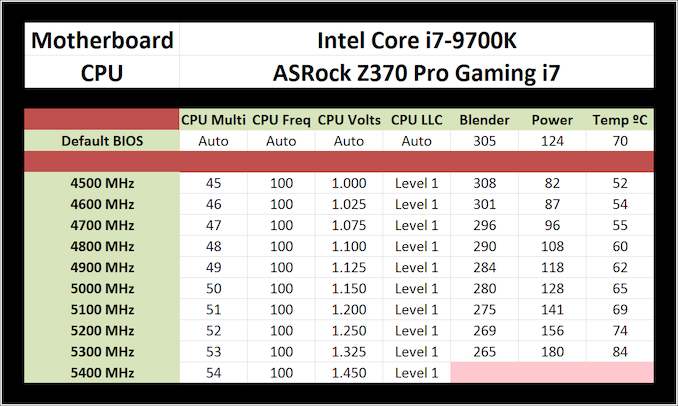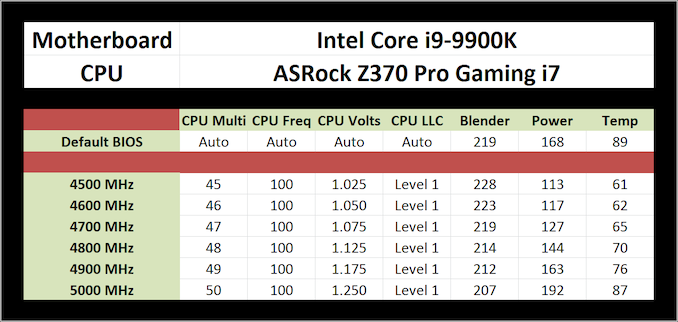The Intel 9th Gen Review: Core i9-9900K, Core i7-9700K and Core i5-9600K Tested
by Ian Cutress on October 19, 2018 9:00 AM EST- Posted in
- CPUs
- Intel
- Coffee Lake
- 14++
- Core 9th Gen
- Core-S
- i9-9900K
- i7-9700K
- i5-9600K
Overclocking
With the upgraded thermal interface between the processor and the heatspreader, from paste to solder, Intel is leaning on the fact that these overclockable processors should be more overclockable than previous generations. We’ve only had time to test the Core i9-9900K and i7-9700K on this, so we took them for a spin.
Our overclocking methodology is simple. We set the Load Line Calibration to static (or level 1 for this ASRock Z370 motherboard), set the frequency to 4.5 GHz, the voltage to 1.000 volts, and run our tests. If successfully stable, we record the power and performance, and then increase the CPU multiplier. If the system fails, we increase the voltage by +0.025 volts. The overclocking ends when the temperatures get too high (85C+).
For our new test suite comes new overclocking features. As mentioned in the previous page, our software loading for power measurement is POV-Ray, which can thrash a processor quite harshly. POV-Ray also does a good job on stability, but is not a substantial enough test – for that we use our Blender workload, which pushes the cores and the memory, and lasts about 5 minutes on an 8 core processor.
Results as follows:
For the Core i7-9700K, we hit 5.3 GHz very easily, for a small bump in power and temperature. For 5.4 GHz, we could boot into the operating system but it was in no way stable – we were ultimately voltage/temperature limited at this case. But an eight core, eight thread 5.3 GHz CPU at 180W for $374? Almost unimaginable a year ago.
Overclocking the Core i9-9900K was not as fruitful. The best bit about this overclock is the 4.7 GHz value: by using our own voltage settings, we reduced power consumption by 41W, almost 25% of the total power, and also reduced temperatures by 24ºC. That's a safe idea. Even 4.8 GHz and 4.9 GHz was reasonable, but the temperatures at 5.0 GHz might not be for everyone. When all cores and threads are loaded, this is one warm chip.












274 Comments
View All Comments
GreenReaper - Friday, October 19, 2018 - link
The answer is "yes, with a but". Certain things scale really well with hyperthreading. Other things can see a severe regression, as it thrashes between one workload and another and/or overheats the CPU, reducing its ability to boost.Cache contention can be an issue: the i9-9900K has only 33% more cache than the i7-9700K, not 100% (and even if there were, it wouldn't have the same behaviour unless it was strictly partitioned). Memory bandwidth contention is a thing, too. And within the CPU, some parts can not be partitioned - it just relies on them running fast enough to supplky the parts which can.
And clearly hyperthreading has an impact on overclocking ability. It might be interesting to see the gaming graphs with the i7-9700K@5.3Ghz vs. i9-9900K@5.0Ghz (or, if you want to save 50W, i7-9700K@5.0Ghz vs. i9-9900K@4.7Ghz - basically the i9-9900K's default all-core boost, but 400Mhz above the i7-9700K's 4.6Ghz all-core default, both for the same power).
NaterGator - Friday, October 19, 2018 - link
Any chance y'all would be willing to run those HT-bound tests with the 9900K's HT disabled in the BIOS?ekidhardt - Friday, October 19, 2018 - link
Thanks for the review!I think far too much emphasis has been placed on 'value'. I simply want the fastest, most powerful CPU that isn't priced absurdly high.
While the 9900k msrp is high, it's not in the realm of irrational spending, it's a few hundred dollars more. For a person that upgrades once every 5-6 years--a few hundred extra is not that important to me.
I'd also like to argue against those protesting pre-order logic. I pre-ordered. And my logic is this: intel has a CLEAR track record of great CPU's. There hasn't been any surprisingly terrible CPU's released. They're consistently reliable.
Anyway! I'm happy I pre-ordered and don't care that it costs a little bit extra; I've got a fast 8 core 16 thread CPU that should last quite a while.
Schmich - Friday, October 19, 2018 - link
You have the numbers anyway. Not everyone buys the highest end and then wait many years to upgrade. That isn't the smartest choice because you spend so much money and then after 2-3 years you're just a mid-ranger.For those who want high-end they can still get a 2700x today, and then the 3700x next year with most likely better performance than your 9900k due to 7nm, PLUS have money over PLUS a spare 2700x they can sell.
Same thing for GPU except for this gen. I never understood those who buy the xx80Ti version and then upgrade after 5 years. Your overall experience would be better only getting the xx70 but upgrading more often.
Spunjji - Monday, October 22, 2018 - link
This is what actual logic looks like!Gastec - Sunday, November 4, 2018 - link
Basically "The more you buy, the more you save" :-\shaolin95 - Friday, October 19, 2018 - link
Exactly. I think the ones beating the value dead horse are mainly AMD fanboys defending their 2700x purchaseeva02langley - Friday, October 19, 2018 - link
Sorry, value is a huge aspect. The reason why RTX is such an issue. Also, at this price point, I would go HEDT if compute was really that important for me.It is not with 10-15% performance increase over a 2700x at 1080p with a damn 1080 TI that I will see a justified purchase.
Arbie - Friday, October 19, 2018 - link
Gratuitous trolling, drags down thread quality. Do you really still need to be told what AMD has done for this market? Do you even think this product would exist without them - except at maybe twice the already high price? Go pick on someone that deserves your scorn, such as ... Intel.Great_Scott - Friday, October 19, 2018 - link
What a mess. I guess gaming really doesn't depend on the CPU any more. Those Ryzen machines were running at a 1Ghz+ speed deficit and still do decently.Intel needs a new core design and AMD needs a new fab.